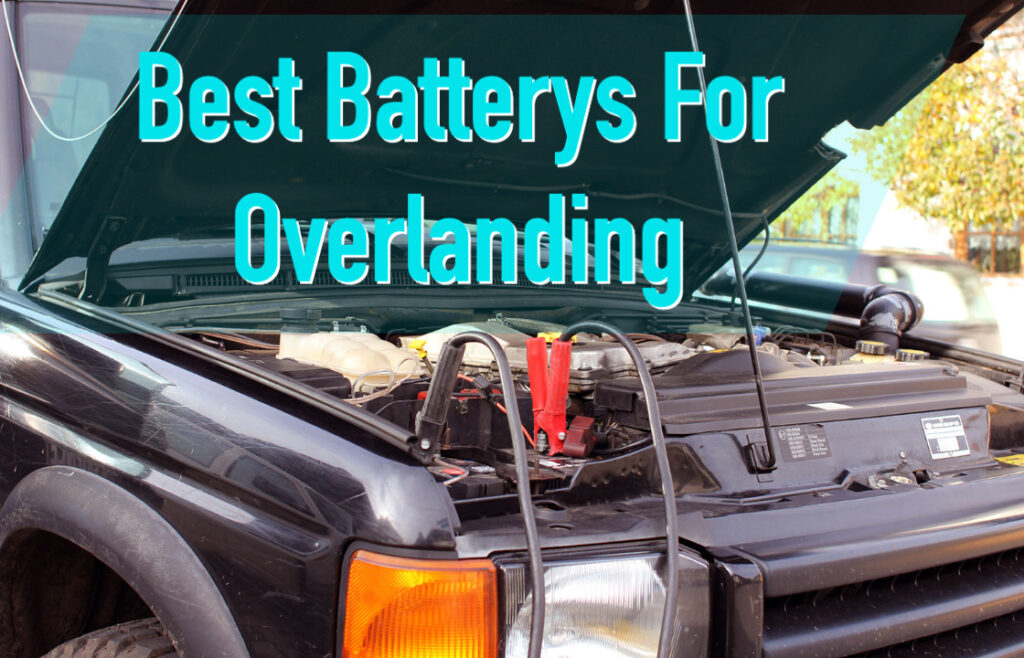The success of an overlanding trip really is won or lost during the preparation stage. And since overlanding is literally all about traveling to the furthest corners of a place to stay off-the-grid, preparation is key!
You need to think about things you wouldn’t ordinarily consider.
A flat battery in the parking lot of a busy shopping mall isn’t much of a stress, but when you compare that to a flat battery when you’re 50 miles away from the nearest cell service and you don’t have a way of getting there, yeah, you can see why people’s stress levels might rise a little.
So in today’s post you’ll find the best battery for overlanding as well as some reasons batteries really matter when overlanding. Ready? Then let’s get to it!

What Type Of Battery For Overlanding?
There is only really one option when it comes to battery types for overlanding and that’s lithium-ion. Their lead-acid alternatives have their place, but definitely not whilst overlanding.
Need more convincing? Here’s all the most important benefits of having a lithium-ion battery.
Smaller And Weigh Less
Your entire world before an overlanding trip becomes dominated by space. You think about picking up that diet again just to save a few extra inches. It’s crazy.
So when you know that lithium ion batteries are smaller and weigh less, they automatically become a better option. It also means you won’t be tempted to leave it at home when the vehicle’s looking full to save space.
Temperature Resistant
Generally, lithium-ion batteries can operate at temperatures between -4 Fahrenheit and 140 Fahrenheit, so no matter where you are, the battery will be fine.
They still work outside of this range too, but it will lead to battery degradation.
Knowing that lithium-ion batteries are resistant to temperature changes, whether it’s hot or cold, leaves you free to explore wherever you like while overlanding.
Charge Faster
Lithium-ion batteries charge faster than lead-acid ones too, so you know that your spare battery can be ready to go in much less time if you’re in a pinch.
It might only be a small thing that helps with convenience, but if you’re having a day where everything goes wrong, you’ll be thankful for the fast-charging battery.
Have Zero Voltage Sag
Voltage sags aren’t something you’ll think about if you already use lithium-ion batteries, since it never happens. But if you’re using lead-acid batteries, then you may have experienced voltage sag when starting your vehicle.
This leads to dimming of your lights and messing with other sensitive equipment in your vehicle. Really, this is the last thing you’ll want when changing to your spare battery, so always use lithium-ion.
Last Better Long-Term
Lithium-ion batteries also have a longer ‘shelf life’ than lead-acid ones, so you can charge them up and keep them with you confidently, knowing that when it’s called upon, it’ll be there to save you in a difficult situation.
If that doesn’t convince you that lithium ions are the best option when taking extended trips off-road, then nothing else will. These are the perfect batteries for overlanding, but why do batteries even matter at all?
Why Batteries Matter in Overlanding
It can’t be stressed enough how important spare batteries are while overlanding. You have to remember that your car battery isn’t behaving like it normally does when you’re off-road.
First, you’re using your car constantly, because that’s the point of overlanding, to have your vehicle take you from A to B to C, all the way through to Z, so you can explore off-road.
That automatically places more demand on your battery because you’re constantly on the move.
Add in the fact that not only is your vehicle always on the move, it’s also your sole source of power while off-grid.
That means you’re charging your phones, tablets, GPS units, radios, lights, and even some refrigerators. That’s one hell of a drain on your vehicle’s battery, and if you aren’t careful, it can die.
Having a spare battery with you is not just sensible, it’s absolutely essential. The importance can not be overstated, because it will save you in a pinch and help get you back to civilization again. Which, you know, is kind of important.
The Best Battery For Overlanding
So that brings us to the best battery for overlanding, but there isn’t just one. Either of the options below are great examples of lithium ion batteries that can be used for extended trips off-the-grid.
They are reliable, compact, and perfect for your peace of mind next time you head out to the wilderness for an adventure-filled overlanding trip!
Optima
Let’s start with Optima batteries and just some of the reasons why these batteries are popular in the overlanding community. First off, they’re made of 99.9% pure lead.
That’s incredible because any impurities in the lead make batteries perform far worse.
The purer the lead, the faster the battery can conduct electricity, the longer it can hold on to its voltage as it discharges, and the faster it will charge up when flat.
So, it’s pretty neat. Optima also designs all their batteries with a hardy outer case, which means it can withstand harsh environments (overlanding), bumps (overlanding) and rough terrain (yeah, overlanding).
That makes this battery one of the best for, you guessed it, overlanding!
Odyssey
As for Odyssey batteries, well, these are equally popular. They’re famous for having, as the manufacturers put it, 2x the power and 3x the life of conventional batteries, and they’re also pretty hardy too.
They’re vibration resistant and can handle even the most extreme temperature conditions, so you can overland wherever you please.
Odyssey batteries are known for their reliability, no matter what you throw at them, and having something like that with you on an overlanding trip is great.
Whichever battery you choose from the ones above, you’ll be able to enjoy your trip without any stress, knowing that your compact battery is ready for anything should you need to use it.
And if you decide to go a different route with your battery choice, please go lithium-ion. They’re far superior and are exactly what you need while overlanding.
